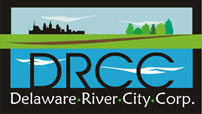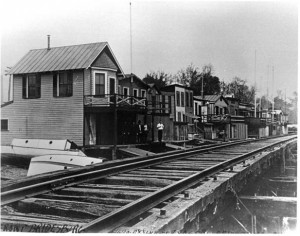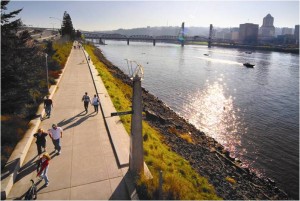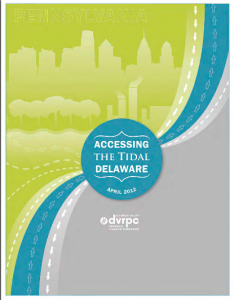Introduction
Like much of the Delaware riverfront, the North Delaware is an under-utilized resource. With its industrial legacy, the North Delaware faces many challenges, including over 700 acres of vacant and under-utilized land, property needing extensive environmental remediation, and many connectivity issues stemming from railroads and highways.
Greenways are a creative solution to this suite of issues, and the area has enormous potential for greenway development in concert with mixed-use, commercial, and residential development.
A number of plans describe how greenways will address needs for public recreation, open space, connectivity, and community development from local to regional scales. The DRCC was established to bring the North Delaware Riverfront Greenway plans to fruition and to support the development of other segments.
2001 North Delaware Riverfront Plan
Philadelphia’s 2001 North Delaware Riverfront Plan envisioned a public, ecologically sustainable riverfront greenway and new community development on the vacant riverfront land. This Master Plan and Cost Benefit Analysis takes the vision a step further by recommending a “Public Greenway” scenario maximizes return on public investment, creates revenue, provides significant recreation and open space for residents and promotes ecological restoration. The consultant team of Greenways Incorporated, Econsult Corporation, and Schelter and Associates worked with the Pennsylvania Environmental Council, the Northeast Riverfront Task Force, and the City to gather all relevant data for the plan, solicit public input, review priorities, and synthesize all of this information into a final implementation plan.
2005 North Delaware Riverfront Greenway: Master Plan and Cost Benefit Analysis
The 2005 North Delaware Riverfront Greenway Plan identifies routes for the North Delaware Riverfront Greenway between the Betsy Ross Bridge and the Philadelphia-Bucks County border.
2009 North Delaware Riverfront Greenway Design Guidelines
DRCC has worked with the City of Philadelphia to write Design Guidelines for the Delaware Riverfront Greenway. This document establishes criteria for the construction of the Greenway by providing design guidelines to developers and others who will implement the Delaware Greenway.
2009 North Delaware Riverfront Greenway Gaps Feasibilty Study
The Pennsylvania Environmental Council (PEC)’s Greenway Gaps Feasibility study analyzes potential trail alignments for the North Delaware Riverfront Greenway. Alignments were evaluated based on quality of experience, waterfront right-of-way, off/on road sections, potential to accommodate trail use, connections to exisitng and planned facilities, obstacles, property ownership, traffic impacts, and environmental conditions.
Accessing the Tidal Delaware
Accessing the Tidal Delaware is a Delaware Valley Regional Planning Commission publication that identifies multimodal transportation options to improve accessibility to the Delaware River throughout the Delaware Valley.
Green 2015
Written by PennPraxis for the City of Philadelphia Department of Parks and Recreation, this action plan describes the connections between vacant land, parks, public health and community development. Green 2015 is Philadelphia’s initiative to add 500 acres of publicly accessible green space to the city and measure progress towards Philadelphia 2035.
Greenworks Philadelphia
Greenworks Philadelphia is a sustainability plan written by the Mayor’s Office of Sustainability. Greenworks Philadelphia describes how Philadelphia can reach 15 targets in energy consumption, equity, economy, and civic engagement by 2015.
Green City, Clean Waters
Green City, Clean Waters is the Philadelphia Water Department’s plan to transform Philadelphia’s urban water management. Green City, Clean Waters addresses Philadelphia’s stormwater management challenges. Philadelphia’s aging combined sewer system easily overflows and reduces water quality in nearby rivers, which has substantial environmental and public health effects. With considerable local and federal funding, PWD will enhance stormwater capture through green infrastructure that mimics or enhances natural processes. 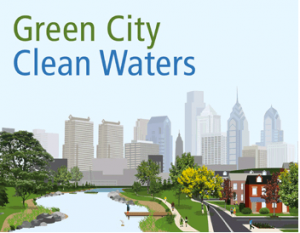
Philadelphia 2035
Philadelphia 2035 establishes city-wide and neighborhood planning projects that will help the city thrive, connect, and renew. These emphases on environmental sustainability, connectivity, and quality of life are manifested in greenway projects, which support all of those goals. Greenways provide opportunities for recreation, ecological restoration while stimulating community and commercial development. The North Delaware district plan articulates how several plans, including station upgrades, historic preservation, environmental remediation, commercial corridor investment, and greenways will intersect to achieve multiple goals.
